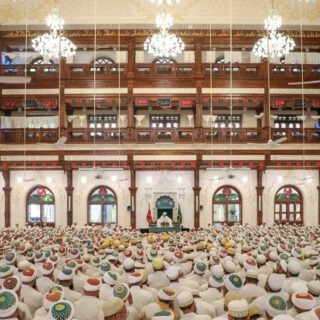Allah has given us wealth, youth, health, time, and our very existence. He has given us these gifts – our life’s capital – so that we express our gratitude for Him by investing these four things in the pursuit of akherat: this is what Rasulallah’s SAW shariah teaches us. In doing so – and in doing so consistently – no matter the circumstances or seasons – Allah maximizes our return on investment by giving us eternal life. For as Rasulallah SAW states, “Allah loves those actions that are done consistently, even if they are small.”
Ensuring consistency, along with taking time into consideration, is paramount. Certain actions must be undertaken at their designated time. Namaz and hajj, both pillars of Islam, are two clear examples. Allah has set specific times at which we must pray namaz, and one season during which we must complete hajj. If we conduct these actions at different times, they will not count. In addition, there are those actions that we must do regardless of the time of day, season, circumstance, or any hardship or barriers we may face.
People have tremendous untapped potential. In order to achieve our full potential, we set goals and act accordingly. However, success-minded individuals often go too big too soon; they end up forsaking their commitments and do not benefit in the long-run. Maula TUS emphasized that if you start small, but establish consistency, then gradually you will build up strength and capacity to perform above and beyond. Take exercise, for example. Most of us have experienced this at some point: we start exercising vigorously for a few days but then lose the resolve or energy to continue. But when we start small, over time we get stronger, and exceed the gains we set out to realize. Rasulallah SAW gave Maulatana Fatema AS 100 tasbihs to pray after each namaz. Allah gives us tenfold for every good deed we do, so after each faraz, when we do Tasbih Fatema AS, we reap 1000 hasanaat. At the end of the day, our total is 5000 hasanat. The hasanat that we gather over time are immeasurable.
An action, small or large, that is done intentionally and faithfully, with an understanding that it will benefit us, is considered virtuous. Rasulallah SAW saw Maulana Hamza AS and Maulana Abbas AS in Jannat; they asked him which deeds are considered most virtuous in Jannat. Rasulallah SAW stated: completing kamil wudu during winter, serving water, and Maulana Ali’s mohabbat.
The story of Maulaya Adam’s QS saqqa is notable in this regard. Syedna Idris Imaduddin RA endeavored to test the strength and devotion of Hindustan’s mumineen, which had grown under the guidance of Maulaya Adam QS, wali al Hind. Maula RA inquired as to whom within his home is adna. Maula RA was informed that there is a saqqa, who serves water to those in the household. Recognizing the virtuousness of the saqqa’s occupation, Maula RA sent two letters, the first instructing that the post of wali al Hind be given to the saqqa. Immediately and faithfully, Maulaya Adam QS carried out this order. He called the saqqa; everyone rose, bowed in tasleem, and informed the saqqa that he was now wali al Hind. Trembling, the saqqa could not comprehend this, but Maulaya Adam QS consoled him and reassured him. Maghrib approached; some suggested that since the saqqa was not yet fully capable of praying imamat namaz, they should wait until he was ready. But Maulaya Adam QS remained steadfast; he refused to delay in carrying out Maula’s RA instructions. So they reviewed his surahs, assisted him with his wudu, and Maulaya Adam and the elders prayed namaz behind a humble saqqa. It was due to Maulaya Adam QS and the mumineen of Hindustan’s consistent and unwavering devotion to Maula RA, in even the most trying of circumstances, that the seat of dawat shifted from Yemen to India.
In Karbala, the enemy not only deprived Imam Husain AS, his family, and followers of water for three days, but slaughtered them on the battlefield and tormented the women of his household. Knowing full well that Imam Husain AS was Nabi Rasulallah’s SAW grandson, they intentionally persecuted him, releasing arrow upon arrow, and spear after spear. They squandered the capital Allah gave them on blasphemous and sinful acts. But Imam Husain AS consistently and constantly, under the hardest circumstances imaginable, sacrificed himself for mumineen’s salvation. Remembering this sacrifice every day, after every namaz, and especially during these nine days, we consistently expend our full energy in the grief and remembrance of Imam Husain AS. And this grief multiplies each moment until we secure a most invaluable return on investment: eternal prosperity.








